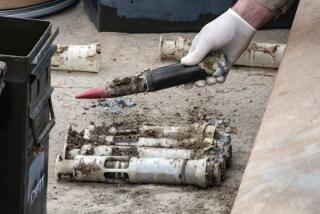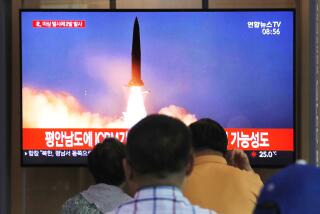Study Downplays Nuclear Threat
- Share via
LONDON — Iraq needs several years and extensive foreign assistance to develop a nuclear weapon, but it could produce one “in a matter of months” if it acquired raw materials from foreign sources, according to a study released Monday by a British think tank.
Welcomed by British leaders who regard Iraqi President Saddam Hussein as an urgent threat, the report by the International Institute for Strategic Studies was a grim portrait of Iraq’s nuclear, biological and chemical weapons capabilities. Nonetheless, the findings were less dire than recent warnings by the British and U.S. governments.
The 74-page dossier examined the risk that U.S. officials have highlighted in recent days: Hussein’s alleged efforts to obtain the fissile material for building a nuclear device.
“While Iraqi acquisition of fissile material on the black market is not a high probability, it has to be seen as a real risk that could dramatically and quickly shift the balance of power,” the study said. Otherwise, it concluded, Iraq would require at least several more years and substantial amounts of foreign materials and equipment to build a nuclear bomb.
Prime Minister Tony Blair is striving to convince dubious Britons of the need to confront Iraq. His government Monday cited the think tank’s assessment as justification for the hard-line stance taken by Blair and the Bush administration.
“The IISS dossier is an impressive chronicle,” said a spokesman for the Foreign Office. “It demonstrates that this [weapons] program continues to this day.”
Nonetheless, defense analysts said Blair will have to make a more convincing case when he presents an official dossier on Iraq’s arsenal, presumably based on intelligence data unavailable to the think tank, in coming weeks.
Nothing in Monday’s report amounts to compelling justification for an immediate military strike, said Charles Heyman, editor of Jane’s World Armies.
“It said there was no justification now, but further down the line there might be,” Heyman said. “There was nothing startling, no killer facts, nothing which says, ‘This has got to be done now.’ I don’t think the population in the U.K. or the U.S. would want to go to war against Iraq with the evidence we had this morning.”
Research for the study began in June. The authors are former weapons inspectors and military experts who drew on information from U.N. inspectors, Iraqi defectors, declassified CIA and Pentagon reports, and other sources cultivated by the 44-year-old think tank, institute director John Chipman told reporters.
Chipman said his organization did not intend to advocate or oppose military action, but rather wanted to put forward the best available facts. He offered a stark summary of the dilemma for U.S. and European leaders.
“Wait, and the threat will grow,” Chipman said. “Strike, and the threat may be used.”
The authors described the development of weapons of mass destruction as the “core objective” of an Iraqi regime that has systematically resisted inspections and “sacrificed all other domestic and foreign policy goals.”
Although it is unlikely that Iraq has nuclear weapons, the authors said, Baghdad’s nuclear ambitions and its scientific and technical expertise have survived war, sanctions, inspections and periodic airstrikes.
It is not known whether Iraq has rebuilt clandestine nuclear facilities since U.N. inspectors were forced out in 1998, but the report said the regime lacks nuclear material for a bomb and the capability to make weapons.
The “wild card” would be the acquisition of plutonium or enriched uranium through smuggling or theft, enabling the regime to “produce nuclear weapons on short order, perhaps in a matter of months.”
But Heyman said nuclear material is rigorously protected. And he added: “To get the fissile material and mate it up with a missile, it would take over a year.”
The authors said the principal menace from Iraq is an array of biological weapons thought to include anthrax and botulinum toxin that are capable of causing “hundreds, if not thousands, of casualties” among civilians in neighboring nations.
Iraq has had more success hiding its biological weapons program than any of its other weapons programs, and Hussein’s regime could have produced thousands of gallons of biological agents since the end of inspections in 1998, the study said.
Iraq’s ability to deliver biological and chemical weapons is uncertain and probably limited, and Hussein has only about a dozen missiles with a range of 400 miles, the report found. That makes an attempted sneak attack using aircraft, terrorists or commandos the most likely option, according to the authors.
As in the 1991 Persian Gulf War, an attack would be likely to target Israel in hopes of provoking Israeli retaliation and rallying Arab support.
Western military planners have to calculate Hussein’s readiness to make such deadly and self-destructive decisions, and the willingness of his military officers to obey his orders if the regime appears doomed, the report said.
Despite the guesswork, there is little doubt about Iraq’s appetite for weapons of mass destruction. If Hussein is left to his own devices, Chipman said, “sooner or later, it seems likely that the current Iraqi regime will eventually achieve its objectives.”
*
Rotella reported from Paris and Stobart from London.
More to Read
Sign up for Essential California
The most important California stories and recommendations in your inbox every morning.
You may occasionally receive promotional content from the Los Angeles Times.













